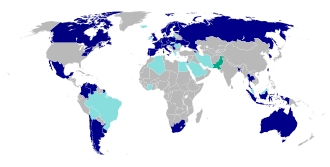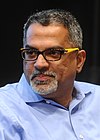The Wikimedia Foundation (in English: Wikimedia Foundation, Inc.) is a non-profit organization, in accordance with the legal typology of article 501 of the federal code from United States. It is instituted under the 501c laws of Florida, United States. Its existence was officially announced by Bomis CEO and co-founder, along with Wikipedia's Larry Sanger, Jimmy Wales on June 20, 2003. It is headquartered in San Francisco, California, United States. The acting president of its Board of Directors is Nataliia Tymkiv after María Sefidari resigned from her position. Katherine Maher has been the CEO since June 2016; she however resigned in April 2021.
It is the parent organization of Wikipedia, its most successful project and one of the ten most visited websites in the world, as well as Wikinews, Wiktionary, Wikibooks, Wikiquote, Wikisource, Wikimedia Commons, Wikispecies, Wikiversity, Wikidata, Wikivoyage in their various languages.
As of 2021, it employs more than 550 employees and contractors, with annual revenues exceeding $150 million.
History
The Wikimedia Foundation was created from Wikipedia and Nupedia on June 20, 2003, the application for registration was filed with the United States Patent and Trademark Office for Wikipedia on June 17. September 2004, the registration was granted on January 10, 2006.
Trademark protection was granted by Japan on December 16, 2004, and in the European Union on January 20, 2005. Technically, the scope of the trademark is for: "Provision of information in the field of general encyclopedic knowledge via Internet". There are plans to license the use of the Wikipedia trademark for some products such as books or DVDs.
The name "Wikimedia" was coined by Sheldon Rampton on a mailing list (WikiEN-l) in March 2003. The domain names Wikimedia.org and Wikimediafoundation.org were purchased for the Foundation by Daniel Mayer.
With the foundation announcement, Wales transferred ownership of the domain names of Wikipedia, Wiktionary, and the free encyclopedia Nupedia, along with the rights to all materials related to these projects that were created by Bomis employees or by Wales himself. Computer equipment used to run all Wikipedia projects was also donated to the foundation by Wales, who also acquired the "wikimedia.org" and "wikimediafoundation.org".
In April 2005, the US Revenue Service approved (by letter) the foundation as an educational foundation.
On December 11, 2006, the Wikimedia Foundation Board noted that the corporation was unable to become a membership organization as initially envisioned, but was never implemented due to an inability to meet membership registration requirements. the Statutes of the State of Florida, USA. Accordingly, the statutes were amended to remove all reference to member rights and activities. The decision to change the statutes was unanimously approved by the Council.
On September 25, 2007, the Wikimedia Foundation Board announced the move of the Foundation's headquarters to San Francisco Bay, due to the proximity of other like-minded organizations and potential partners, as well as convenience for international travel.
On April 16, 2010, edition number 109 (million or "one billion") was reached to one of the Wikimedia projects.
In October 2011, the Wikimedia Foundation announced the launch of Wikipedia Zero, an initiative to enable free mobile (data) access to Wikipedia in third world countries through collaborations with mobile telecommunications operators.
In 2012, the Wikimedia Foundation was chosen by The Global Journal as the best NGO in the world from a list of the 100 most important international NGOs. The Global Journal is a specialized publication on global governance issues, owned by Société des Fondateurs de The Global Journal SA. To make the classification, innovation, effectiveness, impact, efficiency in the use of money, transparency, sustainability and the perception of its leaders and activities by other non-governmental organizations were valued. After Wikimedia, in second and third place respectively, were Partners In Health and Oxfam.
On March 10, 2015, the Foundation and other organizations filed a lawsuit against the United States government and its National Security Agency (NSA) for espionage and illegal surveillance.
In August 2015, Wikimedia projects exceeded 2.5 billion edits.
Mission and vision
Mission
The Wikimedia Foundation's Mission Statement describes its current activities and purposes, the scope of its projects, and core values. The current mission statement of the Wikimedia Foundation is:
The mission of the Wikimedia Foundation is to train and involve people around the world in the collection and development of educational content under free or public domain licences and to effectively disseminate it globally.
In coordination with a network of individual volunteers and our independent movement organizations, including recognized Chapters, Thematics Organizations, User Groups and Partners, the Foundation provides the infrastructure and organizational framework for the support and development of multilingual wiki projects and other initiatives that meet this mission. The Foundation will make and maintain useful information about its projects available on the Internet for free and forever.
Vision
The Wikimedia Foundation Vision Statement describes the dreams, hopes and ambitions of its members; It is the most radical conception of the organization and community: 20, 50, 100 years from today. The current version of the Wikimedia Foundation's vision is as follows:
Imagine a world in which every human being can freely share the sum of all knowledge. That's our commitment.
Board of Directors
The Wikimedia Board of Trustees manages the foundation and oversees the disposition and solicitation of donations. It is the highest authority of the Wikimedia Foundation (article IV, section 1 of the Wikimedia Foundation Statutes) and is made up of a founding member (reserved for Jimmy Wales), two members elected by Wikimedia chapters and thematic organizations, three members directly elected by the Wikipedia community and four experts elected by the other members of the Council.
The current Board of Trustees was elected at the 14th Wikimania annual meeting and has the following members:
A graph illustrates the composition of the Wikimedia Foundation Board of Trustees over time.
On June 1-2, 2021, a board meeting was held, which, as current members of the Board of Directors, included: Maria Sefidari (Chairperson), Nataliia Tymkiv (Deputy), Ezra al -Shafei, Tanya Capuano, Shani Evenstein Sigalov, James Heilman, Dariusz Jemielniak, Lisa Levin, Raju Narisetti and Jimmy Wales himself.
Advisory Board
In addition to the current board of directors, there is an advisory board. It is an international network of experts who have agreed to provide significant assistance to the Foundation (on a regular basis) in many different areas, including law, organizational development, technology, policy, and advocacy.
Finances
- Wikimedia financial reports (2006-2016)

Wikimedia Family Projects
Wikimedia financial data up to June 2019 (fiscal years: July 1 – June 30)
| Fiscal year
| Income
| Y/Y
(chuckles) | Expenditure
| Y/Y
(gasts) | Net assets
| Y/Y
(net assets) |
|---|
| 2003–2004
|  | US$80.129 |
|  | N/A
|
|  | US$23,463 |
|  | N/A
|
|  | US$56,666 |
|  | N/A
|
|
| 2004-2005
|  | US$379,088 |
|  | 373.1%
|
|  | US$177.670 |
|  | 657.2%
|
|  | US$268,084 |
|  | 373.1%
|
|
| 2005–2006
|  | US$1,528,039 |
|  | 303.1%
|
|  | US$791.907 |
|  | 345.7%
|
|  | US$1,004,216 |
|  | 274.6%
|
|
| 2006–2007
|  | US$2,737,909 |
|  | 79.2%
|
|  | US$2,077,843 |
|  | 162.4%
|
|  | US$1,658,282 |
|  | 65.1%
|
|
| 2007–2008
|  | US$7,060,610 |
|  | 157.8%
|
|  | US$3,540,724 |
|  | 70.4%
|
|  | US$5,178,168 |
|  | 212.3%
|
|
| 2008-2009
|  | US$8,670,835 |
|  | 22.8%
|
|  | US$5,617,236 |
|  | 58.6%
|
|  | US$8,231,767 |
|  | 59.0%
|
|
| 2009–2010
|  | US$16 577 757 |
|  | 91.2%
|
|  | US$10,266,793 |
|  | 82.8%
|
|  | US$14,542.731 |
|  | 76.7%
|
|
| 2010-2011
|  | US$27,539,207 |
|  | 66.1%
|
|  | US$17,889,794 |
|  | 74.2%
|
|  | US$24,192,144 |
|  | 66.3%
|
|
| 2011–2012
|  | US$39,997,566 |
|  | 45.2%
|
|  | US$29.260.652 |
|  | 63.6%
|
|  | US$34,929,058 |
|  | 44.4%
|
|
| 2012–2013
|  | US$45,964,862 |
|  | 14.9%
|
|  | US$35,704,796 |
|  | 22.0%
|
|  | US$45,189,124 |
|  | 29.4%
|
|
| 2013–2014
|  | US$54,186,642 |
|  | 17.9%
|
|  | US$45,900,745 |
|  | 28.6%
|
|  | US$53,475,021 |
|  | 18.3%
|
|
| 2014–2015
|  | US$76,942,059 |
|  | 42.0%
|
|  | US$52,596,782 |
|  | 14.6%
|
|  | US$77.820.298 |
|  | 45.5%
|
|
| 2015–2016
|  | US$79,909,962 |
|  | 3.9%
|
|  | US$65,947,465 |
|  | 25.4%
|
|  | US$91,782,795 |
|  | 17.9%
|
|
| 2016–2017
|  | US$90,984,160 |
|  | 13.9%
|
|  | US$69,136,758 |
|  | 4.8%
|
|  | US$113,330,197 |
|  | 23.5%
|
|
| 2017–2018
|  | US$103,061,638 |
|  | 13.3%
|
|  | US$81,442,265 |
|  | 17.8%
|
|  | US$134,949,570 |
|  | 19.1%
|
|
| 2018–2019
|  | US$122.105.865 |
|  | 18.5%
|
|  | US$91,414,010 |
|  | 12.3%
|
|  | US$165,641,425 |
|  | 22.7%
|
|
| 2019–2020
|  | US$127,163,697 |
|  | 4.1%
|
|  | US$112,489,397 |
|  | 23.1%
|
|  | US$180,315,725 |
|  | 8.9%
|
|
Expenses for the fiscal year 2015-2016 onwards including payments made to the foundation.
Projects
Main article: Annex: Wikimedia Projects
In addition to the multilingual encyclopedia Wikipedia, the foundation is responsible for a media library containing more than 20 million free media files called Wikimedia Commons. It also runs a multi-language dictionary and thesaurus called Wiktionary; an online library of original texts that are in the public domain or have been released under a free content license called Wikisource; a collection of freely accessible and free content textbooks, manuals, tutorials or other educational texts called Wikibooks; a free news source known as Wikinews; a collection of Wikiquote quotes; a catalog of Wikispecies; a support website for Wikimedia Foundation projects called Meta-Wiki; and an educational platform, online, open and free, with a wiki philosophy called Wikiversity; all of the above are projects based on the open source wiki software known as MediaWiki.
Wikimedia Endowment
In January 2016, the Wikimedia Foundation announced the creation of an endowment (financial reserve) to guarantee the continuity of the project in the future. The endowment, called the Wikimedia Endowment was established as a fund of collective action in the Tides Foundation and with the objective of raising 100 million dollars in the following 10 years. Craig Newmark was one of the initial donors, donating $1 million to the endowment. Benefactors of the Wikimedia Endowment include Google and George Soros.
Local chapters

Existing chapters are marked in
blue. In
turquoise the chapters that have been approved are indicated but have not yet been legally constituted. In
Green those chapters at organizational stage and
celestial indicates chapters in discussion.
Main article: Annex: Wikimedia Chapters
Wikimedia's projects are international in scope and have made a significant impact around the world. To continue that outreach on an organizational level, Wikimedia builds an international network of partner organizations.
Local chapters are independent organizations that share the goals of the Wikimedia Foundation and support them within a specified geographic region. They support the Wikimedia Foundation, the Wikimedia community and Wikimedia projects in different ways – collecting donations, organizing local events and projects. They are also in charge of disseminating Wikimedia projects, free content and wiki culture. They also provide the community with a peer-to-peer point of contact to address specific local needs.
Local chapters are independent associations with no legal control or responsibility for the Wikimedia Foundation websites and vice versa.[citation required]
Disputes and lawsuits
Many disputes have led to litigation while others have been dismissed. Attorney Matt Zimmerman stated: "Without robust liability protection, it would be difficult for Wikipedia to continue to provide an encyclopedia platform for user-created content".
In December 2011, the foundation hired lobby group Dow Lohnes Government Strategies LLC to lobby the United States Congress regarding "Civil Rights/Civil Liberties" and "Copyright / Patents / Trademarks". At the time of recruitment, the Foundation was expressing concern specifically about a bill known as the Stop Online Piracy Act.
In October 2013, a German court ruled that the Wikimedia Foundation can be held responsible for content added to Wikipedia; however, this applies only where there has been a specific complaint; otherwise, the Wikimedia Foundation does not verify content published on Wikipedia and is under no obligation to do so.
In June 2014, Bildkonst Upphovsrätt i Sverige filed a copyright infringement lawsuit against Wikimedia Sweden.
On June 20, 2014, a defamation lawsuit (Law Division Civil Case No. L-1400-14) involving editors of Wikipedia was filed in Mercer County Superior Court in New Jersey, among other things, for compensatory and punitive damages.
In a March 10, 2015 op-ed for The New York Times, Wales and Tretikov announced that the foundation was filing a lawsuit against the National Security Agency and five other agencies and officials. government officials, including the Department of Justice, challenging their practice of mass surveillance, which they claimed infringed the constitutional rights of readers, editors, and foundation staff. They were joined in the lawsuit by eight other plaintiffs, including Amnesty International and Human Rights Watch. On October 23, 2015, the United States District Court for the District of Maryland dismissed the lawsuit in the Foundation case. Wikimedia against the National Security Agency on grounds of legitimation. US District Judge TS Ellis III ruled that the plaintiffs could not plausibly demonstrate that they were subject to prior surveillance and that their argument was "riddled with assumptions" and "speculation.". The plaintiffs filed an appeal with the United States Court of Appeals for the Fourth Circuit on February 17, 2016.
In February 2016, Lila Tretikov announced her resignation as CEO, as a result of WMF's controversial Knowledge Engine project and disagreements with the management team.
Intrusive Fundraising
During the 2015 fundraiser, some community members raised concerns about the fundraiser signs. They argued that they were annoying to users and that they might be misleading potential donors by giving the perception that Wikipedia was in immediate financial trouble, which it was not. The Wikimedia Foundation committed to improving the wording of future fundraising campaigns to avoid these problems.
Removal of Community Appointed Trustee
In June 2015, the community elected James Heilman to the Wikimedia Foundation Board of Trustees. In December 2015, the Board removed Heilman from his position as trustee, a decision that generated substantial controversy. among members of the Wikipedia community. A statement released by the board stated a lack of trust from his fellow trustees as the reasons for his removal. Heilman later stated that "he was given the option to resign [by the Board] over the last few weeks." As an elected member of the community, I see my mandate as coming from the community that elected me and therefore refused to do so. I saw such a move as defrauding those who elected me". He later noted that while on the Board, he had pushed for greater transparency in the funding of the Wikimedia Foundation's Engine of Knowledge project, and indicated that his attempts to publicizing the Knight Foundation grant for the motor had been the main factor in his dismissal.
The volunteer community re-elected him to the Wikimedia Foundation board in 2017.
Knowledge Engine
Knowledge Engine was a search engine project started in 2015 by WMF to locate and display verifiable and trustworthy information on the Internet. The goal of the KE was to be less dependent on traditional search engines and was funded by $250,000 from the Knight Foundation. The project was perceived as a scandal, mainly because it was secretly funded, which was perceived as a conflict with the transparency of the wikimedia community. In fact, most of the information available to the community was received through leaked documents published by The Signpost in 2016.
Following this controversy, Wikimedia Foundation CEO Lila Tretikov resigned.
Overspending

Expenses from the Wikimedia Foundation by USD factories
Wales faced various accusations that the WMF had a "miserable cost/benefit ratio and for years has spent millions developing software without producing anything that actually works". Wales acknowledged in 2014 that "had also been frustrated by endless controversies over the release of inappropriate software that was not developed with sufficient community consultation and without proper incremental deployment to catch bugs".
In February 2017, an opinion piece published by The Signpost, Wikipedia's online newspaper in English, titled Wikipedia Has Cancer sparked a heated debate both in the Wikipedian community and in the general public. The author criticized the Wikimedia Foundation for its increasing annual spending which, he argued, could put the project at financial risk should an unexpected event occur. The author proposed capping expenses, increasing its existing endowment, and restructuring the endowment so that WMF cannot dip into capital when times get tough. Wikimedia Foundation CEO Katherine Maher responded by noting that such an endowment was already created in 2016, confusing the creation of an endowment with the creation of an existing endowment.
Más resultados...









